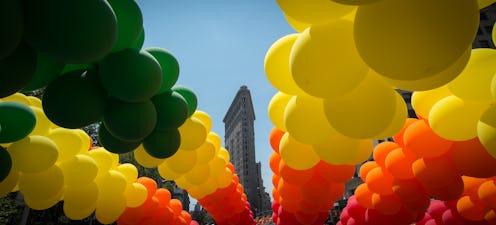The Oxford English Dictionary just announced several new additions to its 600,000 words, and among them is the word "gender-fluid," a term typically used to signify that someone isn't strict in their gender identity. The OED's addition of "gender-fluid" is important both for people who identify as the term, as well as for society as a whole to understand that gender itself is fluid. It's also part of a larger cultural movement away from thinking of gender as a binary and toward thinking of it as a spectrum. (Bustle has reached out to Oxford English Dictionaries for comment and will update this post if/when we hear back.)
The Gender Wiki defines "gender-fluid" as "a gender identity which refers to a gender which varies over time." It explains, "A gender-fluid person may at any time identify as male, female, neutrois, or any other non-binary identity, or some combination of identities. Their gender can also vary at random or vary in response to different circumstances." Indeed, what "gender-fluid" means will vary according to each individual. For example, Orange Is the New Black star Ruby Rose has defined it as "not really feeling like you’re at one end of the spectrum or the other."
The OED's definition is similar: "not clearly or wholly male or female; androgynous; designating a person who does not identify with a single fixed gender; of or relating to a person having or expressing a fluid or unfixed gender identity (now the usual sense)." Not everybody defines it exactly the same way, but that's the point: Gender identity is very personal, and people should have the freedom to determine their own for themselves.
By acknowledging that gender can not only go beyond male or female but also change from situation to situation, we're also acknowledging that gender is a social construct — something that was invented by humans rather than ingrained in our genes. The concept of gender fluidity also reminds us that since gender is a social construct, it can also be an individual construct. In other words, since gendered labels are something that people have created, we also have the freedom to create and adopt them ourselves to express our identities, rather than limit them.
The OED is 150 years old and gets updated every three months. This round of additions also includes "YOLO" ("you only live once") and "splendiferous" (a word created by Roald Dahl, who was born exactly 100 years ago). Then it's got "moobs" — a portmanteau for "man boobs — which is somewhat disappointing. This term is often used to fat-shame people; it also goes against the spirit of the inclusion of "gender-fluid," since "moobs" implies that it's normal for women but not men to have breasts. (Everybody has breasts, and their size doesn't necessarily correlate with gender identity.)
The addition of "gender-fluid," though, is especially encouraging because it's part of a larger trend: Our language is expanding to reflect less rigid gender norms. Last year, Dictionary.com added "Mx.," a gender-neutral honorary for people who don't identity as men or women or who do but don't want to be referred to as "Mr." or "Ms." The site also added "misgender," which means using an incorrect gendered term to talk about someone, earlier this summer — an important step toward letting people define who they are for themselves.
As all these changes show, the way we as a society think about gender is getting less black-and-white. And hopefully, these new additions to our language will not only reflect changes that have already occurred but also make us even more open-minded in the future.
Images: Giphy (2)
